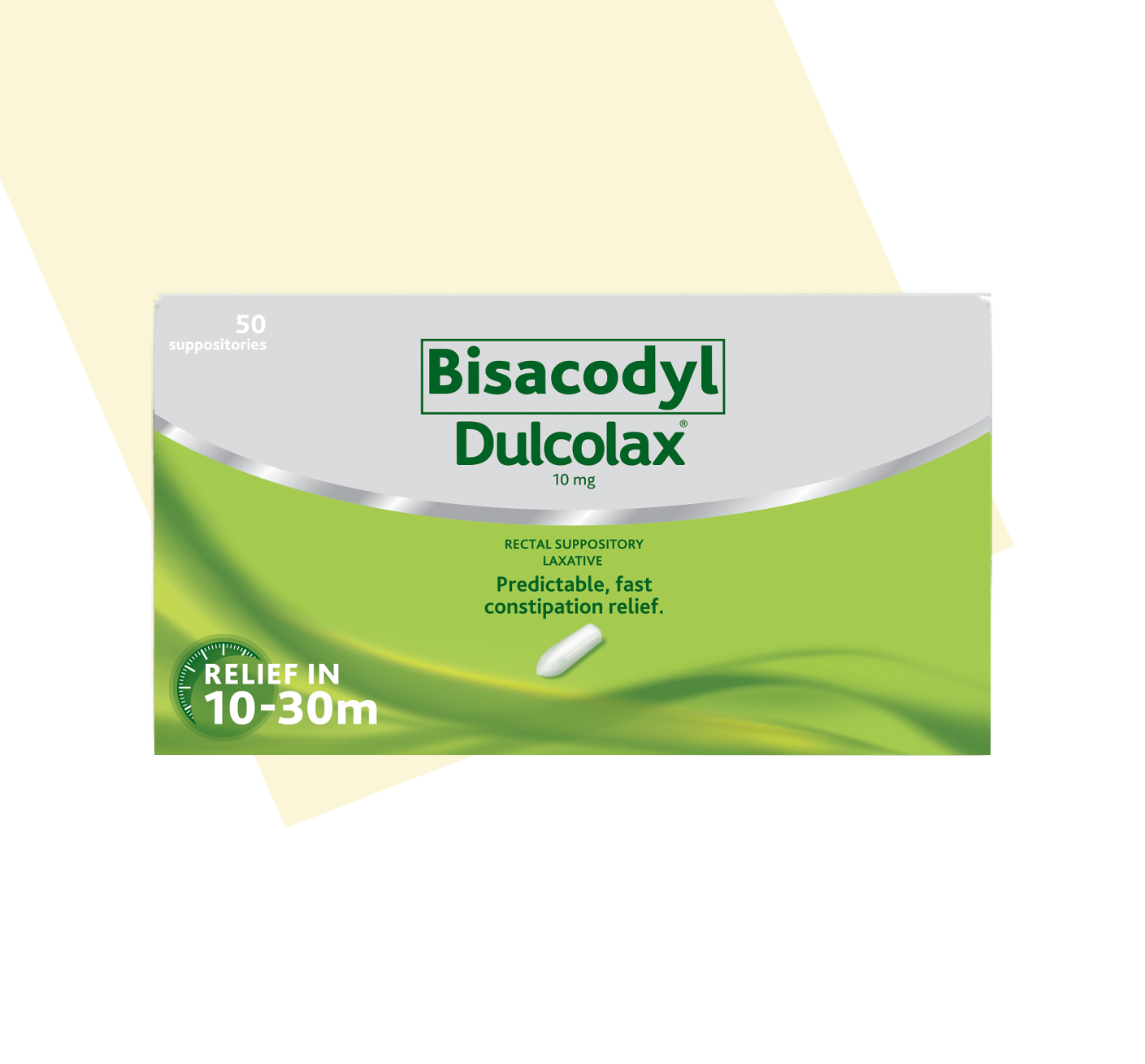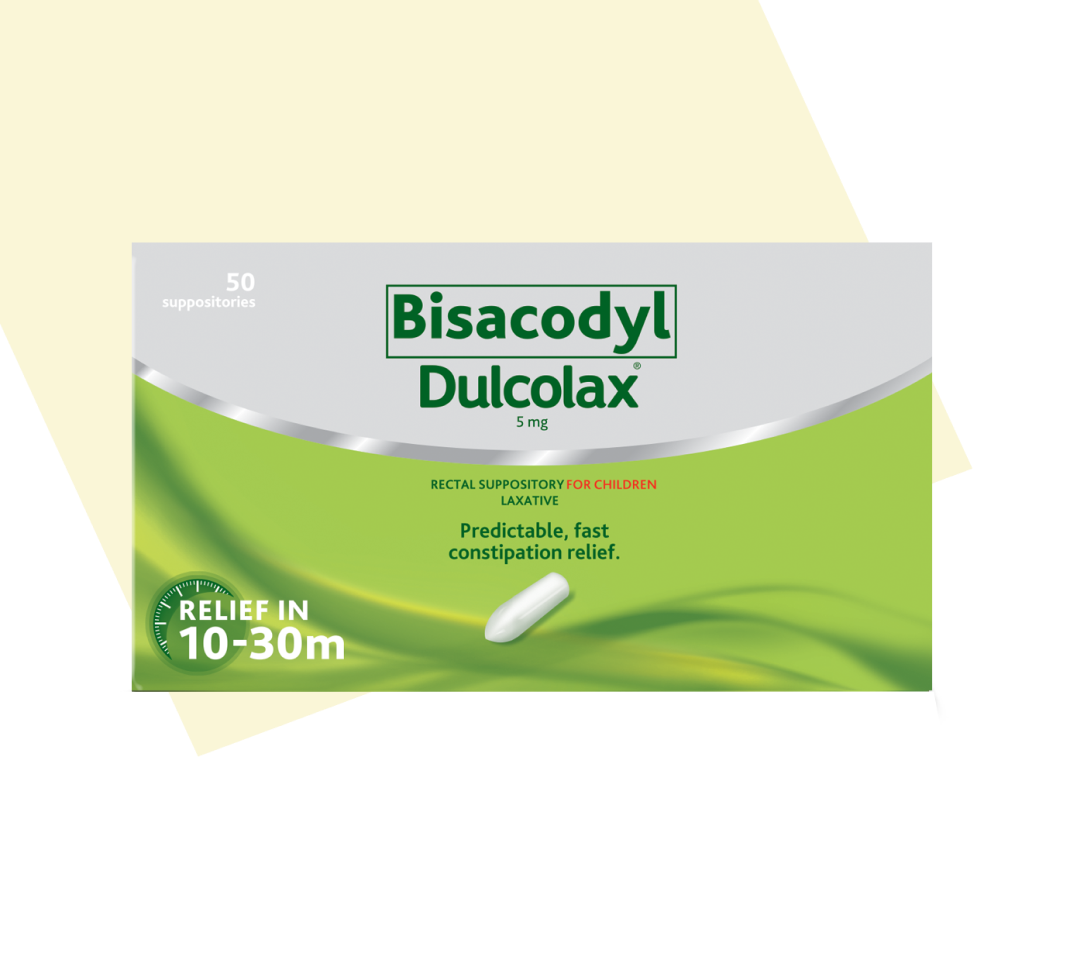Dulcolax Suppositories for Adults benefits
Fast relief
Provides relief in about 20-30 minutes.
Intestinal movement improved
Rehydrates/softens your stools and stimulates gut muscles to ease evacuation for predictable relief vs natural remedies (fruits, tea, water).
Works naturally with your body
Acts locally, directly in the colon where it’s needed
No negative effect on the gut flora3
Use and dosage
The suppositories must be unwrapped and inserted into the rectum pointed end first4. There is no need to remove it. It will dissolve and be evacuated by your body.
Adults and children over 10 years old:
- 1 suppository per day
For pregnant women:
- consult your doctor
Suitable for Diabetics and Celiacs
What is in the product?
Bisacodyl
Dulcolax® Suppositories for Adults contains bisacodyl which has a dual action: it stimulates the smooth muscles of the intestinal walls in charge of passing stool and increases the water content which helps soften the stool to favor evacuation. Thanks to the application directly into the rectum, the action is located where it’s needed. In short, Dulcolax® Suppositories facilitates the evacuation and unblocks your system within minutes, which can be beneficial for those with irritable bowel syndrome.

How does it work?
Once in contact with the colon, the stimulant laxative bisacodyl contained in the suppository will accelerate the stool transition through the colon with its dual action: the rehydration of the stool in the large intestine will soften the stool and the stimulation of the activity of bowel muscles will cause your intestines to contract. This way, evacuation is facilitated, giving you the feeling of being unblocked in 20 minutes (depending on the individual) 2,4,5.
Dulcolax® Suppositories do not have to travel through your stomach and small intestine to become effective. The application directly into the rectum ensures that the active content is released exactly where it is needed. The active metabolite is minimally absorbed so there is no burden to the body.
Frequently asked questions
When you start talking about constipation, the same questions often pop up.
-
This laxative provides a reliable, efficient and quick local action for adults and children over 10 years experiencing occasional constipation. This is a product suitable for those having difficulty swallowing and looking for a fast relief (around 20 minutes).
-
Dulcolax® Suppositories for Adults contain 10 mg of bisacodyl and can be taken by adults and children over 10 years old (under medical supervision).
Dulcolax® Suppositories (pediatric suppository) contain 5 mg of bisacodyl and can be taken by children under 10 years old (under medical supervision).
-
Long experience has shown no evidence of undesirable or damaging effects during pregnancy. But data from adequate clinical studies in pregnant women are lacking. Therefore, during pregnancy and lactation, the product should only be taken under medical advice and the direct supervision of a doctor4.
-
This medication should not be taken on a continuous daily basis or for extended periods without investigating the cause of constipation. Prolonged excessive use may lead to fluid and electrolyte loss and potassium deficiency. Laxatives should be used for no more than 7 days, as infrequently as possible (with a maximum of 1 suppository per day). For longer usage, please consult your doctor or pharmacist.
-
Dulcolax® Suppositories for Adults can be taken at any time during the day, the effect usually occurs in about 20 minutes (range 10 to 30 minutes) after insertion into the rectum2.
-
The suppository is meant for rectal use: Extract the suppository from the lining and insert it into the rectum from the tip side. No need to remove the medicine, it will dissolve and be eliminated along with the stool.
-
The active ingredient of Dulcolax® Suppositories for Adults is bisacodyl, which will act directly on the colon’s muscles and it also induces water and salt transport into the gut to initiate bowel movement, therefore facilitating evacuation. This local action guarantees a quick effect (generally between 10 and 30 minutes).
-
Like every medication, it can have side effects although not everybody gets them. The most common side effects due to Dulcolax® Suppositories are abdominal pain and diarrhea. If you experience side effects, please stop taking the medicines and see your doctor straight away.
-
Dulcolax® Suppositories for Adults, containing 10 mg of bisacodyl, is contraindicated in children under 10 years. Children less than 10 years old may be treated with Dulcolax® pediatric suppositories, containing 5 mg of bisacodyl.
Dulcolax® Suppositories should not be taken by people who are allergic to the active substance (bisacodyl) or to any of the other ingredients in the product.
Also do not take Dulcolax® Suppositories if:
- You have severe dehydration
- You have a bowel condition called “ileus” (blockage in the intestine)
- You have a serious abdominal condition such as appendicitis
- You have severe abdominal pain with nausea and vomiting
- You have a blocked bowel (intestinal obstruction)
- You have inflammation of the bowel (small or large intestine) subject to hereditary conditions incompatible with its active substance or any of the other ingredients.
-
You can download it by clicking here.
-
Dulcolax® Suppositories for Adults can be purchased in pharmacies and parapharmacies.
-
Dulcolax® products, and any other laxatives, do not help with weight loss. They do not reduce the absorption of calories or nutrients. They can cause watery stools (diarrhea), abdominal cramps and dehydration.
-
There are many types of laxatives – each works somewhat differently to make it easier to have a bowel movement.
Suppositories laxatives
Medicated suppositories are a typically reliable fast-acting dosage form of stimulant laxatives that are inserted into the rectum. These suppositories which may contain bisacodyl or glycerin aid in moving stool out of the body by providing lubrication and stimulation. They stimulate the bowel muscles in the intestine to help encourage a bowel movement quickly within minutes.
Rather than another type of laxative, suppositories are an alternative form, to suit oral medications and the needs of people having difficulties swallowing.
Stimulant laxatives
Stimulant laxatives including bisacodyl, the active substance in Dulcolax®, has a dual action: Stimulant laxatives induce water and salt transport into the gut which hydrates the stool and makes it easier to pass. In addition, stimulant laxatives stimulate the activity of bowel muscles causing your intestines to contract. These two effects jointly result in an acceleration of stool transit through the colon and have been proven to be very effective and safe in clinical studies. Effectively stimulating the bowel muscles speed up stool movement. They help get things moving.
Stool Softeners laxatives
Stool softeners are just that — products that help make hard, dry, painful stools softer. They work by softening the stool in the intestine, which makes it easier and more comfortable to pass. When used as directed, stool softeners are a safe, gentle way to keep things moving.
Fiber supplements
Fiber supplements add bulk to your stool. Bulky stools are softer and easier to pass. Fiber supplements are traditionally considered as the first-line treatment. They are generally safe, but may increase bloating, flatulence and abdominal pain, and may interfere with the absorption of some drugs.
Osmotic laxatives
Osmotic or saline laxatives help stool move through the large intestine by reducing intestinal fluid absorption. These laxatives contain poorly absorbed substances that hold additional water inside the colon, creating an osmotic gradient, drawing water into the bowel. This hydrates the stool and makes it easier to pass. As a result, saline laxatives help increase the number of bowel movements. An easier time in the bathroom and regular bowel movements? It’s a win-win.
-
When taking laxatives, side effects can occur during short and long-term treatments (as for any medication). As of today, there is no proof of a specific risk to the colon during long term laxative treatments. Based on experience, stimulant laxatives can be considered safe for long-term use if used as indicated in the patient information/leaflet7.
If high doses are taken over extended periods of time, watery stools (diarrhoea), abdominal cramps and a clinically significant loss of fluid, potassium and other electrolytes can occur which can damage your health by causing disturbances of electrolyte and mineral balances. Sodium, potassium, magnesium, and phosphorus are electrolytes and minerals that are present in very specific amounts necessary for proper functioning of the nerves and muscles, including those of the colon and heart. Upsetting their balance can cause incorrect functioning of these vital organs. Kidney damage and muscle weakness have also been described in association with chronic laxative abuse4.
-
Available data do not indicate a risk for habituation or addiction 8, 9. Some people suffering from constipation symptoms need to use laxatives constantly to maintain bowel movements without complaints. These people with chronic constipation do not achieve regular bowel movements without complaints such as abdominal discomfort or severe straining. But this constant use is not the result of prior laxative intake. It is rather their condition causing the need for constant use and this should not be misinterpreted as addiction.
Addiction does not have a pharmacological basis because most laxatives are not absorbed and none cross the blood brain barrier which means that they do not reach the brain to cause physical addiction 8, 9.
-
Using a suppository involves a few simple steps. Here’s a quick guide:
1. Preparation
Wash your hands with soap and water to avoid introducing bacteria.
Unwrap the suppository from its packaging carefully.
If it's too soft, place it in the refrigerator for a few minutes. Alternatively, refrigerate the suppository in its packaging to help maintain cleanliness and prevent contamination.
2. Positioning
Choose a comfortable position. Lying on your side with your top knee bent toward your chest is often easiest.
You can also squat if that’s more comfortable.
3. Insertion
Use your fingers to gently insert the suppository pointed end first into the rectum, about 1 inch (2.5 cm) in for adults.
Avoid forcing it in; it should go in smoothly.
4. Hold in Place
Stay in position for a few minutes to allow the suppository to stay in place as it begins to dissolve.
Try to avoid a bowel movement for at least 15-20 minutes to let the medication absorb.
5. Wash Hands Again
Wash your hands again after insertion to maintain good hygiene.
If using it to relieve constipation, the suppository should usually work within an hour, but specific instructions may vary by medication. Always follow the instructions on the packaging or from your healthcare provider.
-
Dulcolax® Suppositories are typically available in packs containing four 10mg suppositories. The price varies by retailer and location, with options often available at local pharmacies or online.
Dulcolax® range of solutions
Dulcolax® products help your digestive system get moving, with different reliefs available: overnight relief and fast relief so you can feel good inside and out!
Stay informed
Constipation symptoms can be extremely bothersome and persistent– bloatedness, hard stool and gassiness. Because we know how frustrating and stressful these periods can be, we can help identify the causes for constipation and how to prevent them.
- Kamm, M. A. et. al. Oral bisacodyl is effective and well-tolerated in patients with chronic constipation. Clin.Gastroenterol.Hepatol. 2011; 9(7):577-583.
- Müller-Lissner S. Pharmacokinetic and pharmacodynamic considerations for the current chronic constipation treatments. Expert Opin Drug Metab Toxicol. 2013 Apr;9(4):391-401.
- Corsetti M, Landes S, Lange R. Bisacodyl: A review of pharmacology and clinical evidence to guide use in clinical practice in patients with constipation. Neurogastroenterol Motil. 2021 Mar 9:e14123. doi: 10.1111/nmo.14123. Epub ahead of print. PMID: 33751780.
- Irish Pharmaceutical Healthcare Association (IPHA). Dulcolax 10 mg Suppositories SPC. 2017. https://www.medicines.ie/medicines/dulcolax-10-mg-suppositories-31928/spc
- Opella. 2.5 Addendum to the Clinical Overview (Inication: Constipation and Preparation of diagnostic procedures, in pre- and postoperative treatment). 2018.
- Lyseng-Williamson KA. Macrogol (polyethylene glycol) 4000 without electrolytes in the symptomatic treatment of chronic constipation: a profile of its use. Drugs Ther Perspect. 2018;34(7):300-310.
- Bharucha AE, Lacy BE. Mechanisms, Evaluation, and Management of Chronic Constipation. Gastroenterology. 2020 Apr;158(5):1232-1249.e3. doi: 10.1053/j.gastro.2019.12.034. https://doi.org/10.1053/j.gastro.2019.12.034
- Bellini M, Gambaccini D, Usai-Satta P, De Bortoli N, Bertani L, Marchi S, Stasi C. Irritable bowel syndrome and chronic constipation: Fact and fiction. World J Gastroenterol. 2015 Oct 28;21(40):11362-70.
- Müller-Lissner SA, Kamm MA, Scarpignato C, Wald A. Myths and misconceptions about chronic constipation. Am J Gastroenterol. 2005 Jan;100(1):232-42.





